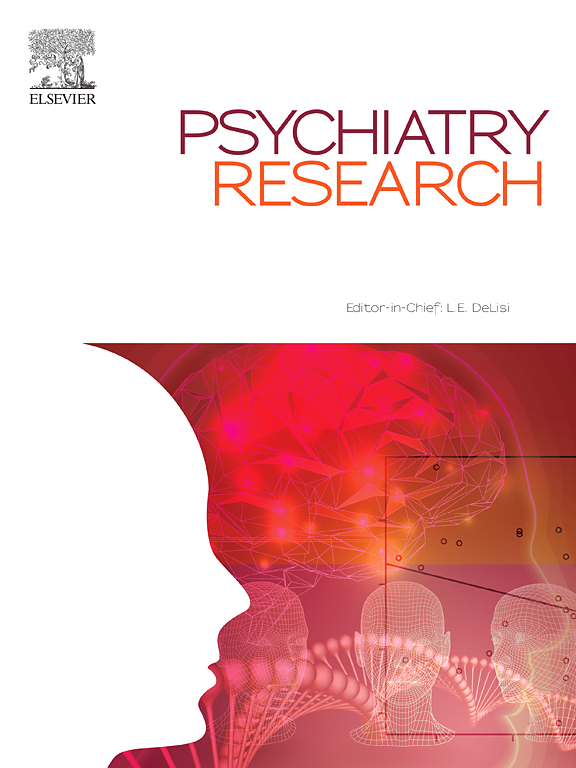Online mindfulness-based vs. cognitive-behavioural stress reduction for medical students: A randomized controlled trial
IF 4.2
2区 医学
Q1 PSYCHIATRY
引用次数: 0
Abstract
Objective
This study evaluated the effects of Mindfulness-based stress reduction(MBSR) and cognitive behavioural stress reduction(CBSR) on depression, anxiety, and perceived stress in medical students.
Method
A total of 323 medical students studying in Ankara, Turkey, applied to participate and were assessed using the Mini International Neuropsychiatric Interview. Medical students with a psychotic disorder, manic episode, major depressive disorder with suicidal ideation, or previous experience with MBSR or cognitive-behavioural treatment were excluded from the study. After randomization, 253 students were allocated to either online MBSR (n = 127) or CBSR (n = 126). Symptoms of anxiety, depression, and perceived stress were assessed at baseline and post-intervention (week 8). Both intention-to-treat (ITT) and per-protocol (PP) analyses were conducted. Multiple imputation was used to address missing data. All interventions and assessments were conducted online, making this one of the few studies to evaluate digital mental health interventions in this population.
Results
In the ITT analysis, both interventions had small to moderate effects on improving depression (MBSR: d = 0.50; CBSR: d = 0.40), anxiety (MBSR: d = 0.73; CBSR: d = 0.52), and perceived stress (MBSR: d = 0.48; CBSR: d = 0.42), with no significant differences between them. The PP analysis revealed moderate to strong improvements in depression (MBSR: d = 1.03; CBSR: d = 0.74), anxiety (MBSR: r=-0.74; CBSR: r=-0.72), and perceived stress (MBSR: r=-0.80; CBSR: r=-0.68). While both interventions were comparable in reducing depressive symptoms and perceived stress, MBSR demonstrated superior efficacy in reducing anxiety.
Conclusions
The findings indicate that both MBSR and CBSR may be effective in reducing anxiety, depression, and perceived stress in medical students. Greater adherence appears to enhance outcomes, particularly for MBSR in alleviating anxiety symptoms.
医学生在线正念与认知行为减压:一项随机对照试验
目的探讨正念减压(MBSR)和认知行为减压(CBSR)对医学生抑郁、焦虑和感知压力的影响。方法共有323名在土耳其安卡拉学习的医学生申请参加,并使用迷你国际神经精神病学访谈进行评估。有精神障碍、躁狂发作、有自杀意念的重度抑郁症或有正念减压疗法或认知行为治疗经验的医学生被排除在研究之外。随机化后,253名学生被分配到在线MBSR (n = 127)或CBSR (n = 126)。在基线和干预后(第8周)评估焦虑、抑郁和感知压力症状。进行了意向治疗(ITT)和方案分析(PP)。采用多重插值解决缺失数据。所有的干预和评估都是在线进行的,这使得这项研究成为少数几个评估这一人群中数字心理健康干预的研究之一。结果在ITT分析中,两种干预措施对改善抑郁均有小到中等程度的影响(MBSR: d = 0.50;CBSR: d = 0.40)、焦虑(MBSR: d = 0.73;CBSR: d = 0.52)和感知压力(MBSR: d = 0.48;CBSR: d = 0.42),两组间无显著差异。PP分析显示抑郁症有中度至重度改善(MBSR: d = 1.03;CBSR: d = 0.74)、焦虑(MBSR: r=-0.74;CBSR: r=-0.72)和感知压力(MBSR: r=-0.80;CBSR: r = -0.68)。虽然两种干预措施在减轻抑郁症状和感知压力方面具有可比性,但正念减压在减轻焦虑方面表现出更优越的功效。结论正念减压和心念减压均可有效减轻医学生的焦虑、抑郁和感知压力。更强的依从性似乎可以提高疗效,尤其是正念减压疗法在缓解焦虑症状方面。
本文章由计算机程序翻译,如有差异,请以英文原文为准。
求助全文
约1分钟内获得全文
求助全文
来源期刊

Psychiatry Research
医学-精神病学
CiteScore
17.40
自引率
1.80%
发文量
527
审稿时长
57 days
期刊介绍:
Psychiatry Research offers swift publication of comprehensive research reports and reviews within the field of psychiatry.
The scope of the journal encompasses:
Biochemical, physiological, neuroanatomic, genetic, neurocognitive, and psychosocial determinants of psychiatric disorders.
Diagnostic assessments of psychiatric disorders.
Evaluations that pursue hypotheses about the cause or causes of psychiatric diseases.
Evaluations of pharmacologic and non-pharmacologic psychiatric treatments.
Basic neuroscience studies related to animal or neurochemical models for psychiatric disorders.
Methodological advances, such as instrumentation, clinical scales, and assays directly applicable to psychiatric research.
 求助内容:
求助内容: 应助结果提醒方式:
应助结果提醒方式:


